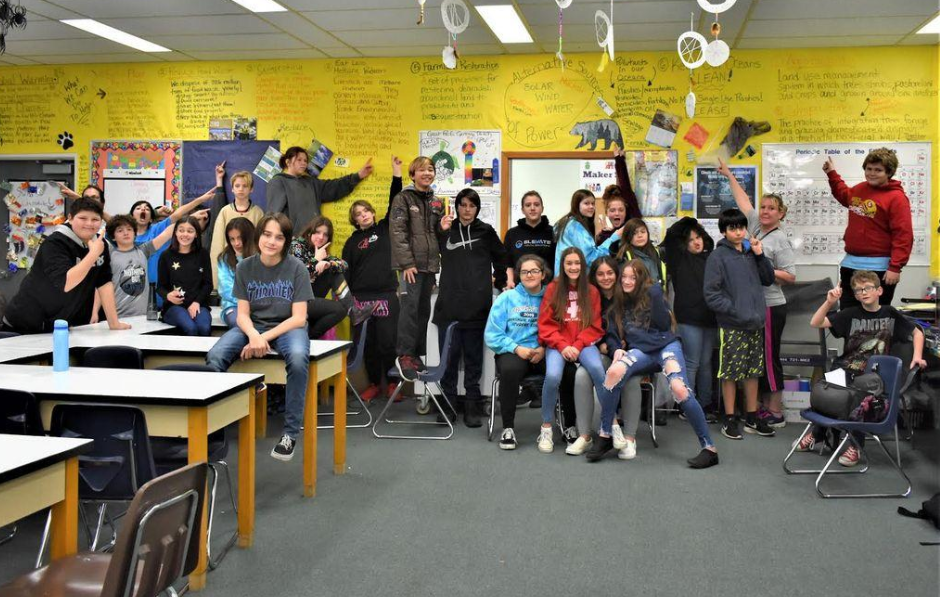

Dunsmuir Elementary School is taking responsibility for the future of the planet by becoming the next generation of changemakers to identify and act on climate-related opportunities in Dunsmuir through Monterey Bay Aquarium’s of the Climate Action Project, otherwise known as CAP
DES teachers Rami White and Kathleen Shirley went to the aquarium for training on climate issues and with the tools and resources provided, they are teaching their sixth through eighth grade students how to make changes to help support their environment’s future with conservation, adaptation, mitigation, and innovations to reduce pollution and emissions.
The school’s program is called Food and Film Festival. The films are about climate change and ocean acidification and how it is affecting our lives and what can be done to change this. The food is a cooking class which teaches the students to shop locally and seasonally for sustainable foods, thereby reducing pollution from cutting back plastics and trucking emissions.
The book “Draw Down,” edited by Paul Hawken, was supplied by the aquarium and used as the reference guide for the curriculum.
Students decided to move away from single use plastics and use bamboo utensils and reusable plastics. They are creating their own cookbook which will be part of their presentation. The next step is to grow their own herb garden and worm vermiculture which teaches them science through gardening, soils, and composting from foods leftover from the school’s cafeteria.
This program started at DES last year, when the students made a chicken wire turtle filled with plastic garbage that won a first place and people’s choice award at the Siskiyou Golden Fair.
“Some of these kids have never eaten artichokes, beets or brussel sprouts,” said Shirley. “The recipes they choose are created from foods that are found locally … It all ties together with what we put in our bodies, what we put in the air and how we treat the planet. They, the next generation, needs to fix the climate.”
“Our program is food based because a lot of Dunsmuir kids don’t have good eating habits,” said White. “We took a survey and we knew they’d enjoy it. They were engaged.
The kids are assigned a seasonal vegetable or fruit grown locally, White explained. They research it and share something interesting about it and find recipes using the food.
The students also use food in their art projects, and they’ll use the art in their cookbook. In April, six of the 21 students will get to travel to the Monterey Bay Aquarium to make a presentation with their cookbook and trifold displays for other participating schools.
They will go on field trips to Spring Hill Nursery and Berryvale Grocery as part of the project.
“I think every school should learn about the environment because of the decline of the earth and increase of viruses,” said Takuma Ui, age 12. “We need to stop the garbage, the plastics, the Co2 so the coral reefs won’t keep dying. I think the fires in Australia have something to do with global warming. By planting our own foods, we will alleviate shipping which releases emissions in the air and will help with our climate warming. I loved the cauliflower/broccoli salad with pasta cooked in beet water that we prepared today.”
Haze Brill, also 12, said, “This gives us the opportunity to learn more about climate change and how it’s affecting our earth so our generation can stop global warming and be more sustainable. Organic foods are healthy and more filling so we eat less. Unhealthy foods create more trash with packaging, more emissions with shipping. So, it is better to eat local foods to sustain our environment.”
“Working together cooking the food is the only time we don’t argue,” said 14 year-old Nick Hodges. “I’ve learned that our planet changes over and over and people are ruining it by throwing away plastics and oil in the ocean. The water and the trees in our world are being destroyed and we won’t be here once our trees are gone. Everything that breaths will be gone too. We can prevent this from happening.”
“Our school is embracing the reality that we can make a difference and have to make a difference,” said DES principal Susan Keeler. “I am very proud that our teachers take these projects on to give these kids life’s experiences, empowering them to take care of their planet.”
Article Credit: masterra.com
